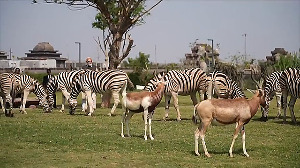The Indian Air Force is strengthening its air defence in Ladakh along the Line of Actual Control with China by putting in place a series of special mountain and light-weight radars.
Western Air Command chief Air Marshal N A K Browne told media-persons in New Delhi on Friday that different types of radars would be put in place along the 667-km LAC with China, the air defence of which is the WAC's responsibility. "The Air Force is keenly examining the option of special type of radars, which we call the mountain radars and we are also looking at Low Level Light Weight Radars (LLLWR). So there is a definite plan," Browne said to a question on the future air defence systems along the LAC.
The IAF's move comes close on the heels of reports of recent incursions by Chinese military helicopters into Indian airspace. Browne said the IAF would put in place these radars in the next four to five years to make the air defence system along the LAC robust. "When I talk of operational infrastructure to be improved in the northern sector, the mountainous terrain is very tricky. Because you have huge peaks and normal conventional systems are very difficult to maintain there," he said.
Browne said the IAF had already given contracts for 19 of LLLWRs and that the WAC itself had some of these. "More are in the pipeline. They are coming starting from next year itself," he added.
Browne said the IAF also had the option of an indigenously developed LLLWR. At present, the IAF has placed along the LAC two Rohini radars developed by Defence Research and Development Organisation and manufactured by Bharat Electronics Limited."One more Rohini radar is to be inducted next year and placed along the LAC," he said. "These, I think, will take care of detection of any threats that come from across the LAC," he added.
Browne parried queries on the IAF's response to Chinese helicopters violating Indian airspace in Ladakh, but he said India needed to keep talking to all its neighbours and at the same time maintain highest levels of military preparedness.
"We do need to talk to everybody...every one of our neighbours and at the same time keep our gun powers dry. We should maintain our preparedness at the highest levels," he said.
The WAC chief also admitted that the IAF was fully aware of what was going on along the LAC, but reiterated that there were issues such as differing perceptions of the LAC on both sides. On the recent remarks of IAF chief Air Chief Marshal P V Naik that India's Air Force fleet was just one-third of China's, he said the IAF was extremely well-balanced on all fronts such as numbers, technology, modern platforms and equipment.
"It is not just a question of numbers, there are other issues such as technology and capability too," he said, dismissing the Chinese fleet strength as a threat. Browne noted that the IAF had in the last year-and-a-half activated new Advanced Landing Grounds (ALG) in Ladakh along the LAC at Daulat Beig Oldi, Fukche and at Nyoma as recently as a week ago.
"As of now, only these three ALGs will be operated. We do not have intention to activate any new ALGs in the near future," he added. Asked if the Chinese military activity across the LAC facing Ladakh had increased in recent times, the WAC chief said it was routine and that they are doing their activity during summer.
"It is their side of the LAC. They have full freedom, just as we have, to operate in their area," he added. On some of the future plans of the WAC, Browne said the IAF would base two Su-30MKI squadrons in Punjab by 2011, two units of Mi-171V medium lift helicopters too would be inducted in Rajasthan and in Jammu and Kashmir, apart from operating indigenous Shakti-engine-fitted Dhruv Advanced Light Helicopters and 10 HAL-engine-fitted Cheetal helicopters in high altitude areas of Jammu and Kashmir, including Siachen. He said the Light Utility Helicopters, for which IAF had recently issued tenders, too, would be inducted in Siachen in the future.
These apart, the IAF would also improve its air defence units along all over Punjab and Jammu and Kashmir, he added. "All these are in tune with our focus to improve all- round offensive and air defence capability, operational infrastructure, and modernisation plans," Browne said.









 © 2025
© 2025